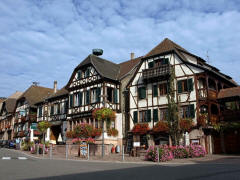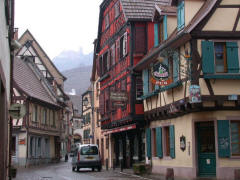Page 1 2 3 4 5 6 7 8 9 10 11 12 13 14 15 16 17 Saturday, 15 August. It was another pleasant, mostly sunny day. We ate early and went to the disembarkation briefing in the lounge at 8:30. We would have liked to go back into Strasbourg, but timing was a problem. The shuttle buses into town didn't start until 9:15. Even if we could get on the first one, it would be 10:00 before we would get to the city center. We would have, at most, an hour before we would have to start walking back to catch a shuttle bus that would have us back at the ship by 11:45 when lunch was to be served. Then there was also the chance that we wouldn't be able to get on the shuttles for this tight schedule. We decided it was too much hassle for one hour in town. We spent the time starting to pack. The reason lunch was so early was that there was an optional tour through Alsatian wine country leaving at 1:30. Because we had been to Strasbourg a few times before, we had decided to take that tour. It turned out to be a good choice because it was far and away the best optional tour of the trip. As on the tour to Baden-Baden, but with better results, the bus took the scenic route to Riquewihr, our final destination. We turned off the autoroute (expressway) at Selestat and followed the Alsatian Wine Road from Chatenois, through Kintzheim, Orschwiller, St. Hippolyte, Rorschwihr, Bergheim, and Ribeauville, until we turned off at Hunawihr a little before 3:00. The communes were charming, with well-kept half-timbered houses and flowerboxes in every window, much like those we'd seen along the Mosel. Many of the buildings had stork nests, often on special circular racks designed to hold them.
From several points along the road, we could see Koenigsbourg
Castle high on a ridge. Originally built in the 12th century, the Castle was
destroyed a couple of times and finally abandoned about 1632. It was
completely rebuilt (1900-1908) by Kaiser Wilhelm II, not for military
purposes, but to strengthen Alsace's
bond with Germany. Alsace has passed back and forth between Germany and France
several times.
We got to Hunawihr about 3:00. The reason for our stop here was to visit the Center for the Reintroduction of Storks and Otters, just outside the town. Storks were once plentiful in Alsace, but by 1975 the stork population had fallen to ten nesting pairs. The reason was that 90% of the birds migrating to Africa were killed there. By limiting the migration of only part of them, this unique facility's has brought the stork population in Alsace up to 400 nesting pairs. We spent about an hour there and must have seen close to 100 storks, most free to come and go as they pleased. One three-month old chick, not yet able to fly, sat alone on a nest surrounded by a fence. There were a number of exhibits about the storks, and a woman from the Center led us on a tour. The Center has more recently began a similar effort to build up the European otter population, and there were otters on display.
It was another charming town of half-timbered houses, these all in pastel shades. It still looks much like it did in the 16th century. It still has its medieval walls, gates, and even a tower (Dolder Tower, 1291). A castle overlooking the town is now a museum. We walked up the Rue de General de Gaulle and through the Dolder Tower where the wall was double. On the way back, we stopped and bought a couple packages of macaroons to use as gifts when we got to Italy. They were ridiculously expensive, but it's a tourist town.
The bus left a little after 5:00 and, taking the autoroute all
the way, we were at the ship in an hour. The ship sailed for Basel at 7:00,
just as we sat down for the Captain's farewell dinner, with extra courses and
the tradition parade of the baked Alaska. Then there was a port talk about
Basel at 8:45, and finally the Crew Show. Page 1 2 3 4 5 6 7 8 9 10 11 12 13 14 15 16 17
Copyright © 2000-2023 DarrellPeck.com All rights
reserved. | ||||||||






_small.jpg)